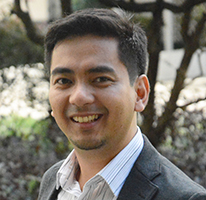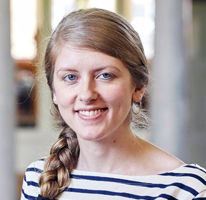People
Digital Studio Director
Professor David Goodman

Professor David Goodman is Director of the Digital Studio, and a history professor.
Ed., and MA in History at the University of Melbourne, and a PhD in History at the University of Chicago. He taught at the University of Sydney 1986-89 in American and Australian histories, and has taught at the University of Melbourne since 1990, first in Australian studies and then in American history. His 1994 book Gold Seeking - Victoria and California in the 1850s was published by Allen and Unwin and Stanford University Press; his 2011 book Radio's Civic Ambition: American Broadcasting and Democracy in the 1930s was published by Oxford University Press, New York. His recent publications have been on the history of broadcasting in the United States; he is now completing a study of the local debate about American entry into World War 2.
Digital Studio Project Officer
Digital Chamber Researchers
-
Thomas Keep
Tom Keep is a PhD candidate in Archaeology, under the supervision of Dr Gijs Tol and Associate Professor Andrew Jamieson of the University of Melbourne, and external supervisor Dr Rhodora Vennarucci at the University of Arkansas. He is interested in how the value of archaeological research can be most widely, equitably, and engagingly distributed in the digital era. He has previously worked as a research assistant at LithodomosVR under University of Melbourne alumnus Dr Simon Young.
-
Samuel Holleran
Sam Holleran’s PhD examines public participation in the reimagination of urban burial sites and he is a member of the DeathTech Research Team at the University of Melbourne. He is also an interdisciplinary artist and writer whose work examines the power and politics imbued in urban design, and in particular, the use of everyday objects in cities, like street furniture, parks, and signage. He has worked as an art director, researcher, and educator in the field of civically-engaged design with the Center for Urban Pedagogy (CUP) in New York City and the Chair for Architecture and Urban Design at ETH-Zürich. He tweets @sam_holler.
-
Andrew Fuhrmann
Andrew Fuhrmann is a PhD candidate in the School of Culture and Communications at the University of Melbourne. He is currently researching the work of Melbourne-based contemporary dance choreographer Lucy Guerin AO. He also has a research interest in performing arts archives and curates the Theatre and Dance Platform with Rachel Fensham, an archival project initiated by the Digital Studio at the University of Melbourne.
-
Rodrigo Gonzalo Encinar
Rodrigo Gonzalo Encinar is a researcher, visual artist, and designer. His research revolves around analytical explorations of representation, focusing on the latent possibilities of the photographic and moving image archives in the digital age for the study of movement.
Rodrigo's PhD studies the Beryl De Zoete collection of moving images made in Bali during the 1930s. The project discusses data-as-artifact in an era of disembodiment, where the roles of the ones involved in the production and preservation of knowledge are being challenged. By examining the affordances of motion capture and motion analysis technologies for the study of movement and their application to the documentation of dance, the research redefines the concepts of the authentic and the valuable within the fields of performance, dance, media, and archive studies.
Interested in joining the Digital Chamber community? We welcome applications from researchers, particularly early career researchers, working in fields relating to digital humanities and social sciences.
Digital Studio Visiting Fellows
Visiting fellowships
The Digital Studio supports international knowledge exchange across the digital humanities, arts and social sciences, by hosting a range of fellows and visiting researchers.
Are you interested in being hosted by the Studio as a visiting fellow?
For more information please Contact us.
Past fellows

Dr Rafael Cabredo
The Digital Studio hosted Dr Rafael Cabredo from 19 October to 14 December 2019, in partnership with Graduate House as part of the United Board Fellowship program.
Biography
In a fast-paced information age, leaders need to be agile and adaptive to the changing educational landscape. All decisions and actions should be supported by verified data and be grounded in established values of the institution.
Dr Rafael Cabredo is the Dean of the College of Computer Studies at De La Salle University in the Philippines. Digital humanities is a burgeoning domain for researchers at De La Salle University, with new collaborations established between the College of Computer Studies and the College of Liberal Arts supporting the development of a number of local digital heritage projects – from documenting native dance and local languages, to using natural language processing to analyse historical texts and literature. Dr Cabredo’s research draws on classical music training to blend music theory with computer science techniques, such as discovering how different chord progressions evoke emotional responses in listeners.
Project outline
As an Honorary Fellow in the Digital Studio, Dr Cabredo explored how the digital humanities are delivered at the University of Melbourne, examining models for interdisciplinary practice and collaboration that can help inform research at his home university. He engaged with academics across faculties at Melbourne to share perspectives and approaches that support the continuing development of digital humanities tools and methods in the Philippines.

Dr Liz Stainforth
The Digital Studio hosted Dr Liz Stainforth from June to October 2018, as part of the Australian Endeavour Fellowship Scheme.
Biography
Being based in the Digital Studio was a brilliant experience. Taking part in the Studio’s Digital Heritage Seminar Series, provided invaluable networking opportunities and connected me with other Digital Humanities researchers.
Elizabeth Stainforth completed her doctoral studies in 2016 and has since worked as a Postdoctoral Fellow at the Institute for Advanced Studies in the Humanities (University of Edinburgh) and as a Lecturer at the University of Leeds. Her research explores digital heritage and memory cultures, and she is currently working on a collaborative book-length project about digital archiving practices (provisional title: All and Each: Dialogues in the Digital Archive). She has been an Associate Editor for parallax journal and published articles in journals including Museum and Society and Digital Humanities Quarterly.
Project outline
Elizabeth’s Endeavour Research Fellowship explored digital heritage culture in Australia, and the ways in which digital cultures inform wider social transformations. The study focused on Trove, a digital heritage aggregator hosted by the National Library of Australia, which provides online access to a range of Australian cultural heritage resources. Trove is one among a number of aggregators, including Europeana, Digital NZ and the Digital Public Library of America, that point towards the reimagining of library and museum spaces online. This development raises important questions about the negotiation of public space, collections preservation and cultural engagement in the digital environment. The project had two distinct but related aims: first, to investigate the development of Trove, alongside comparable initiatives, in order to promote new understandings of their infrastructures; and second, to look at the social context for digital heritage, with an emphasis on the collections of Australian public heritage institutions.
Digital Studio Steering Committee
The Steering Committee meets bi-monthly to oversee the Digital Studio’s strategy and policy
Membership
TBC